Parents of School-Aged Children
When your child turns 3, they will be able to transition from an IFSP (Individualized Family Service Plan) to an IEP (Individualized Education Program). It’s critical that parents make themselves aware of their child’s rights and their parental rights, as well as the resources and support that are available to them. Here are some of our community’s most-used resources:
Office of Exceptional Children This office is part of the North Carolina Department of Public Instruction. Its goal is to help students with disabilities grow and succeed in learning, physical health, emotions, and job skills. They do this by creating a personalized education plan for each student and making sure they learn in a setting that fits their needs while including them as much as possible with other students. Find more information and your contacts within this department at their website.
Parent Rights & Responsibilities in Special Education This is a handbook that tells parents and caregivers their rights as members of their child’s IEP team. Your child’s school should share this with you at your first IEP meeting, but you can read it to prepare ahead of time with this digital copy.
National Down Syndrome Society (NDSS) NDSS is a national organization that empowers individuals with Down syndrome and their families by driving policy change, providing resources, engaging with local communities, and shifting public perceptions. Their education resources for school-age individuals are tailored to those with Down syndrome but are not specific to North Carolinians because they serve all of the United States. We recommend you start with their printable education resources—especially their learning profile (now available in English and Spanish)—if this is the first time you’ve seen their education resources.
Exceptional Children’s Assistance Center (ECAC) These resources are not specific to children with Down syndrome but are specific to North Carolinians. ECAC has a special emphasis on children with disabilities or special health care needs. Their website has a list of local resources available to you by county, free webinars, and a ton of free resources on just about any topic you can think of related to your child. We recommend starting with Medicaid and Medicaid Waivers and Individualized Education Program (IEP). You can also speak to a Parent Educator for free to get your questions answered by a trained parent of a child with a disability.
Duke Law Children’s Law Clinic Services Their “Resources and Links” page has reports on hot topics in the North Carolina Special Education community. It also has resources on many topics specific to North Carolina students with disabilities, including bullying in schools, private schools, school discipline, and more. The page also includes links to the websites for: specific school systems in the state; support and information for parents and advocates; advocacy organizations; and laws affecting children with disabilities.
The Learning Program This is a 10-month program run by the North Carolina Down Syndrome Alliance. It helps families of children with Down syndrome by offering monthly online sessions and easy-to-use materials. These sessions focus on reading, math, speech, and everyday skills. Families learn ways to support their child’s learning at home and stay involved in their education. We recommend that you sign up for the Learning Program as soon as we open registration (usually late summer), but you can join us any time before the last session in mid-June.















